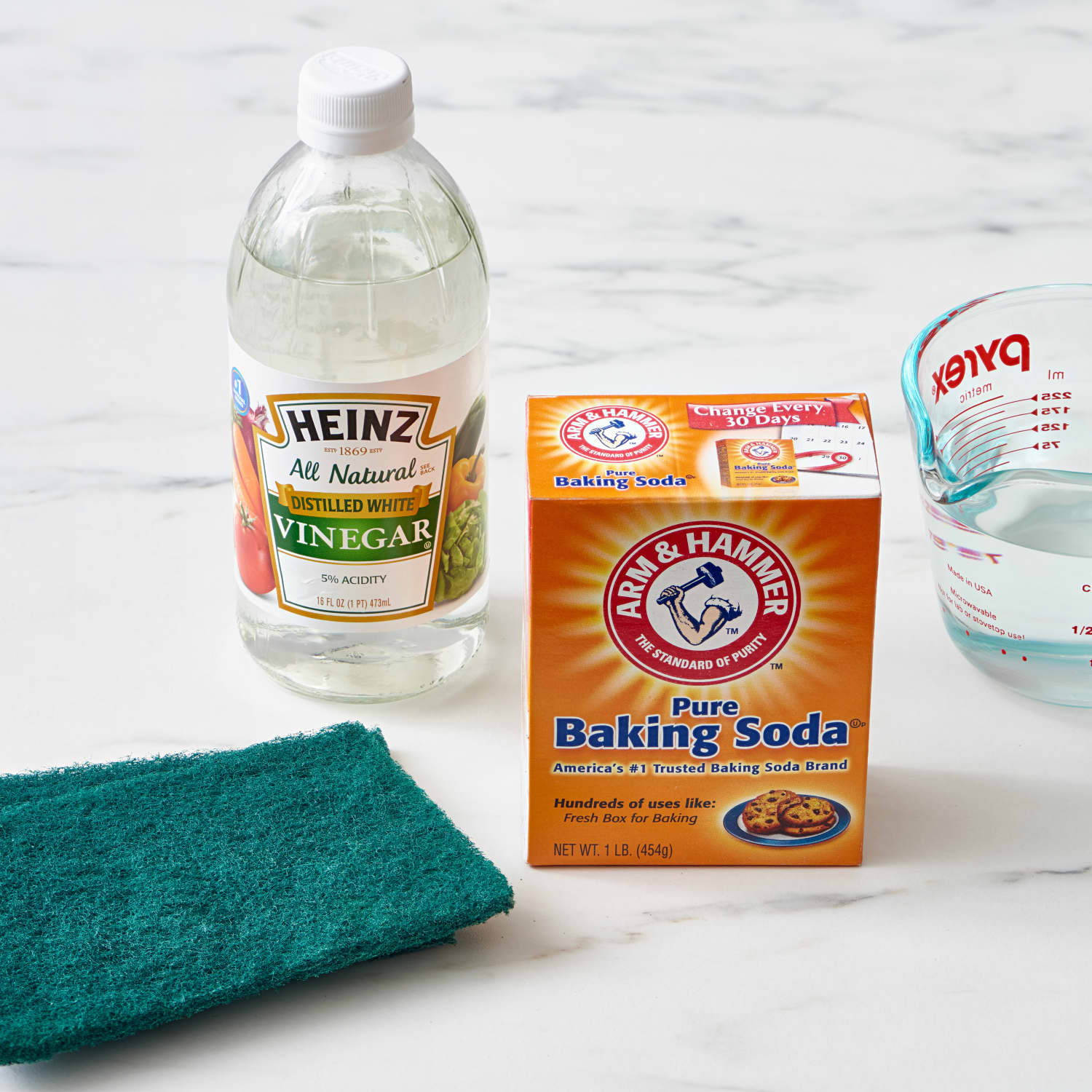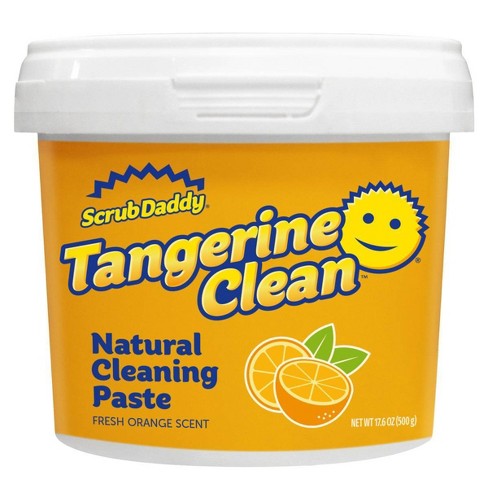

- All-purpose cleaner: Mix 1 cup vinegar, 1 cup water, and 15-30 drops of essential oils
- Glass cleaner: Combine 1.5 cups vinegar, 1.5 cups water, and 5-10 drops of lemon oil
- Floor cleaner: Mix 2 cups vinegar, 1 cup baking soda, 4 liters hot water, and 30 drops of essential oils
These DIY cleaners are cost-effective, eco-friendly, and can be customized with different essential oil blends to create pleasant scents while cleaning.
EWG-Verified Bathroom Products

- AspenClean Bathroom Cleaner, Lavender & Lime
- ATTITUDE Nature + Daily Shower & Tile Cleaner, Citrus Zest
- Earthley Cleaning Paste, available in Lemon-Thyme and Unscented varieties
These products offer effective cleaning solutions while prioritizing consumer safety and environmental responsibility, providing a healthier alternative to conventional bathroom cleaners that may contain harsh chemicals.
Homemade Baking Soda Scrubs

Baking soda scrubs offer an affordable and effective DIY exfoliation option suitable for both face and body. These gentle scrubs can be customized to address various skin concerns while providing a natural alternative to commercial products.
- Basic recipe: Mix baking soda with water to form a paste
- For dry skin: Add honey or coconut oil for extra moisture
- For oily skin: Incorporate lemon juice to help control excess oil
- Body scrub: Combine 1 cup baking soda with 1/2 cup sweet almond oil and essential oils
3
- Sensitive skin Lemon Oil Disinfectants

Lemon essential oil is a powerful natural disinfectant, making it an excellent choice for homemade cleaning products. Its antibacterial and antifungal properties effectively combat harmful microorganisms while leaving a fresh, citrusy scent. To create a simple lemon oil disinfectant:
- Mix 20 drops of lemon essential oil with 1 cup of water and 1 cup of white vinegar in a spray bottle
- Use this solution to clean surfaces, floors, windows, and bathrooms
- For added antimicrobial power, combine lemon oil with other essential oils like tea tree or eucalyptus
Lemon oil disinfectants are particularly effective against common foodborne pathogens, including E. coli and Salmonella. When using lemon oil for cleaning, remember to dilute it properly and avoid direct skin contact, as it can cause photosensitivity. This natural alternative not only sanitizes but also helps reduce the use of harsh chemicals in the home.
Plant-Based Toilet Bowl Solutions

Plant-based toilet bowl cleaners offer an eco-friendly alternative to traditional chemical-laden products, effectively tackling tough stains while minimizing environmental impact. These solutions often come in innovative formats like dissolvable strips or tablets, reducing plastic waste and transportation emissions. Key features of plant-based toilet bowl cleaners include:
- Biodegradable formulas safe for septic systems
- Powerful cleaning action against limescale, mineral deposits, and rust stains
- Pleasant natural scents from essential oils like lemon, rosemary, and peppermint
- Compact, plastic-free packaging that saves storage space
- Easy-to-use formats such as drop-in strips or tablets that fizz and foam
While these products may come at a higher price point than conventional cleaners, they offer benefits in terms of sustainability and reduced chemical exposure. When choosing a plant-based toilet bowl cleaner, look for options free from harsh chemicals like chlorine, phosphates, and synthetic fragrances to ensure a truly eco-friendly cleaning experience.

Non-toxic shower sprays offer an eco-friendly solution for keeping bathrooms clean while avoiding harsh chemicals. These plant-based formulas effectively combat soap scum, mildew, and water spots without leaving harmful residues. Many options contain natural ingredients like vinegar, tea tree oil, and citrus extracts, which provide antimicrobial and deodorizing properties.
- Look for biodegradable, septic-safe formulas made with naturally derived ingredients
- Some brands offer concentrated tablets or bars that dissolve in water, reducing plastic waste
- Popular scents include tea tree, eucalyptus, and lavender, which provide a fresh, clean aroma
- Many non-toxic sprays are multi-purpose, suitable for use on showers, tubs, tiles, and fixtures
When using non-toxic shower sprays, regular application can help prevent buildup and minimize the need for deep cleaning. For best results, spray surfaces after each use and allow the product to air dry.
Eco-Friendly Tile Cleaners

Eco-friendly tile cleaners offer effective cleaning solutions without harsh chemicals, making them safe for families, pets, and the environment. These non-toxic formulas are designed to tackle stubborn grime on various surfaces, including ceramic, porcelain, natural stone, and grout. Many eco-friendly options utilize plant-derived ingredients and biodegradable formulas, ensuring they’re gentle on surfaces while still providing powerful cleaning action.
- Look for cleaners with natural antibacterial properties, such as those containing essential oils like tea tree or lemon
- Some eco-friendly tile cleaners incorporate probiotic technology, which continues to protect surfaces from harmful bacteria for days after application
- DIY options include mixing vinegar with a small amount of eco-friendly dish soap and water, or using a paste made from baking soda and water for tougher stains
- For those preferring commercial products, look for non-toxic, professional-strength formulas that are safe for use on multiple surfaces, including marble and granite
When selecting an eco-friendly tile cleaner, prioritize products that are free from harsh chemicals, artificial fragrances, and dyes to ensure a truly non-toxic cleaning experience.
While baking soda and vinegar are individually effective cleaning agents, combining them for cleaning is not recommended. When mixed, they react to form water and carbon dioxide, essentially neutralizing each other’s cleaning properties. This reaction produces bubbles, which may give the illusion of cleaning power, but the resulting solution is no more effective than salt water. Instead of mixing them, use baking soda and vinegar separately to maximize their cleaning potential:
- Use baking soda as an abrasive cleaner for surfaces and to neutralize odors.
- Apply vinegar to break down mineral deposits and tackle hard water stains.
- For drain cleaning, pour baking soda followed by vinegar, then flush with hot water after 30 minutes.
By using these ingredients individually or in sequence, you can harness their unique properties for more effective eco-friendly cleaning throughout your home.
Tea Tree Mold Removers

Tea tree oil is a potent natural antifungal agent that effectively kills mold and prevents its regrowth. To create a tea tree mold remover, mix 1 teaspoon of tea tree oil with 1 cup of water in a spray bottle. This solution can be applied directly to moldy surfaces without rinsing, as the tea tree oil will continue to work against mold spores. The antimicrobial properties of tea tree oil make it particularly effective against black mold, with studies showing it can eliminate mold spores by destroying their cell walls. When using tea tree mold removers, keep in mind:
- The solution has a strong scent that dissipates over time
- It’s safe for people and pets when used properly
- A small amount goes a long way, making it cost-effective despite the higher price of tea tree oil
- For larger areas, scale up the recipe while maintaining the 1:1 ratio of teaspoons of oil to cups of water
While tea tree oil is highly effective, it should be used as part of a comprehensive mold prevention strategy that includes addressing moisture issues and improving ventilation in problem areas.
Natural Cleaning Takeaways


